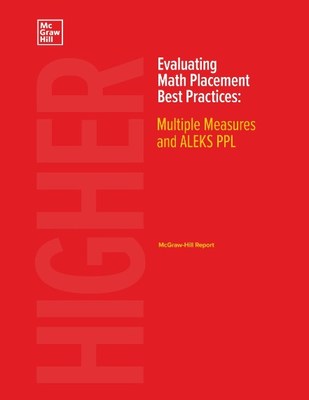New Report Examines Best Practices for Advancing Accurate College Math Placement
Latest research indicates that ALEKS PPL can most effectively and affordably increase student success across all demographics
Dec 9, 2019
NEW YORK, Dec. 9, 2019 /PRNewswire/ -- McGraw-Hill today published a new report on college placement, offering an in-depth look at the latest research and best practices that colleges are using to effectively assess and support students at one of their most critical educational moments. The report, "Evaluating Math Placement Best Practices: Multiple Measures and ALEKS PPL," examines a variety of placement methods and the relative efficacy of each approach. The report also details new research that supports the effectiveness of adaptive technology, such as the ALEKS PPL solution, to identify and repair math skills, which advances math placement and increases course success for all student groups.

The report can be downloaded at: https://www.mheducation.com/highered/aleksppl/efficacy-and-research.html#placement
Nationwide, millions of college students are incorrectly placed in math courses each year, with many of these placements based on a single standardized placement test. With the goal of more accurately placing students, institutions have begun using alternative methods, including multiple measures. While additional metrics paint a broader picture of a student, compiling these metrics can often be costly and inadvertently put certain students at a disadvantage.
"Accurate math course placement is absolutely critical, not only to ensure a student's success in their first college math course, but also to improve the likelihood of success in subsequent courses and career readiness," said Kathleen McMahon, Managing Director for higher education mathematics at McGraw-Hill. "An incorrect placement can have an unintended, long-term negative impact on a student's college and career trajectory."
Today, adaptive technology such as ALEKS PPL can enhance a multiple measures approach to placement by helping to pinpoint exactly what a student knows - and what they don't - when they enter college. The latest research underscores that a student's math foundation is the best predictor of course readiness, and that improved placement occurs when students refresh missing skills as part of the process. This more personalized approach to placement testing and review strengthens outcomes and can be instrumental in helping close the equity gap.
According to the Mathematical Association of America, only 50% of students pass college-level math each year. However, an analysis of more than 80,000 students at more than 40 two- and four-year institutions placed in classes using the artificially intelligent ALEKS PPL showed it to be a stronger predictor of success, with a 76% average student success rate in college-level math courses and higher.
Moreover, the research also found that ALEKS PPL can help to further educational equity. By directly targeting each student's unique knowledge gaps – which can vary significantly based on differences in prior math education opportunities – ALEKS can produce transformative math success results across large student populations, regardless of ethnicity, gender, age or income.
"Incorrect math placement costs students time, money and, often, confidence. It can also derail the pursuit of in-demand and high-paying STEM career paths," McMahon said. "ALEKS PPL helps ensure that every learner, regardless of their educational background, gets placed in the course best suited to their unique needs, empowering them to achieve long-term success."
To learn more about ALEKS in higher education and read more success stories, visit: https://www.mheducation.com/highered/aleks.html
McGraw-Hill
McGraw-Hill is a learning science company that delivers personalized learning experiences that drive results for students, parents, educators and professionals. We focus on educational equity, affordability and learning success to help learners build better lives. Headquartered in New York City, McGraw-Hill has offices across North America, Asia, Australia, Europe, the Middle East and South America, and makes its learning solutions for PreK-12, higher education, professionals and others available in more than 75 languages. Visit us at mheducation.com or find us on Facebook, Instagram, LinkedIn or Twitter.
Contact:
Tyler Reed
McGraw-Hill
(646) 766-2951
tyler.reed@mheducation.com
SOURCE McGraw-Hill

